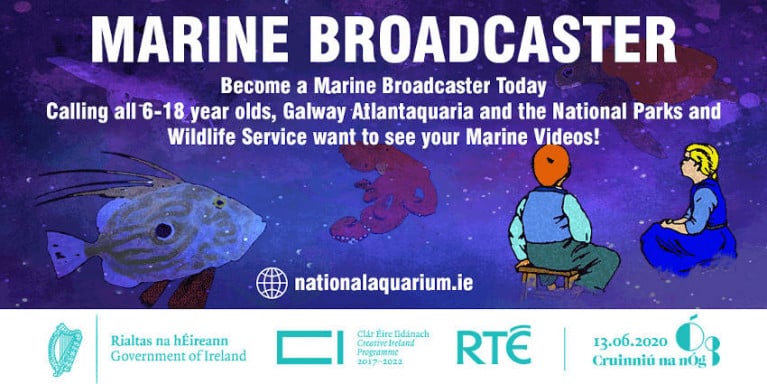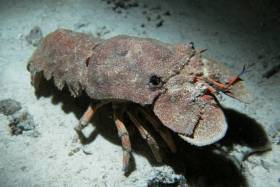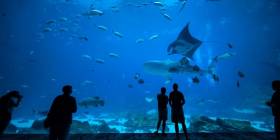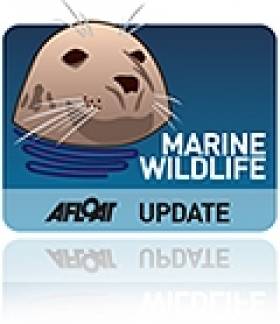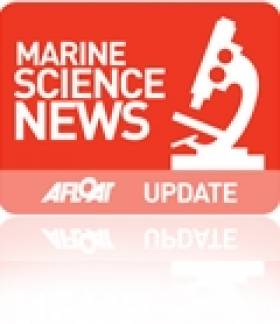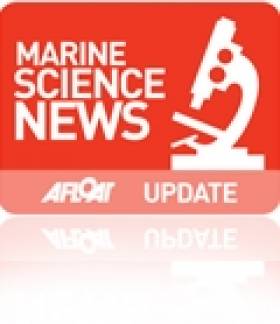Displaying items by tag: Galway Atlantaquaria
Marine Experts and Musicians Come Together to Inspire Climate Action in Unique Community Project for Galway
Music for Galway’s Cellissimo Festival and Galway Atlantaquaria have teamed up for an ambitious project to spark community exploration of the local impacts of climate change on our seas and marine biodiversity — and inspire action to address the climate emergency.
Galway Bay Is Calling will bring together marine conservationists, behavioural scientists and scores of professional and community musicians, singers and performers from across Galway city and county in a unique creative collaboration that will pose individual and collective responses to the climate emergency through music and performance.
Music for Galway, the classical music resource organisation, and Galway Atlantaquaria, Ireland’s largest native-species aquarium, have secured investment through the Creative Ireland Climate Action Spark Fund to develop the project.
“Galway Bay Is Calling fits right into a central theme of Cellissimo, our international cello festival which takes place for the second time across Galway city and county from 18-25 May next year,” says Music for Galway chief executive Anna Lardi.
“As well as producing an exciting, accessible international music festival, we are approaching Cellissimo as a vehicle to creatively highlight the impacts of climate change, with a particular focus on the plight of climate migrants.”
Dr Maria Vittoria Marra, education and public engagement officer at Galway Atlantaquaria added: “We are delighted to have this opportunity to work with Music for Galway and ATU (Atlantic Technological University) on this social art project which aims at harnessing the power of music and performance to increase the ocean literacy of local musicians, not only with a view to strengthen their awareness of our impacts upon the ocean and its impact upon us, but also to provide them with tools and approaches to transform ocean knowledge into behaviours and action that promote ocean sustainability.”
Galway Bay Is Calling promises an exciting interactive series of ocean literacy workshops where participants will explore Galway’s coastline and marine life through beach combing and rock pooling, attending workshops and contributing to discussion and debate on climate change.
The group will work with scientists and researchers at ATU in Galway city to understand people’s behaviours and the key approaches that can influence attitude and ignite community transformation.
The Galway Bay Is Calling collective will then collaborate in groups with renowned Florence-based Irish cellist, singer and composer Naomi Berrill to articulate their experiences of the workshop and research work, exploring ideas for community responses.
Berrill will take these inputs and write a new composition for the collective, who will rehearse their parts independently before coming together in Galway a week before Music for Galway’s Cellissimo Festival in May 2024 to rehearse collectively.
The world premiere of Galway Bay Is Calling, a new composition for solo cello and a mixed-bag orchestra, will be presented at the opening day of Cellissimo in Galway on Saturday 18 May 2024.
The progress of Galway Bay Is Calling will be documented and shared over the coming months on participants’ social media channels. Details of Cellissimo will be announced later this year.
Galway Atlantaquaria has been nominated as an “Explore Your Shore” project hub for Galway City.
The nomination has been made by the National Biodiversity Data Centre and the Environmental Protection Agency.
For over 20 years, Galway Atlantaquaria staff have walked the rocky shores of Grattan Beach in Salthill, recording the marine wildlife and elusive biodiversity that is hidden just below the surface of the small pools, and under the rocks by the shore.
From stranded sharks, humble hermit crabs, tiny flatfish, gobies, blennies, and glass eels, it says its aquarists have “seen it all”.
 Galway Atlantaquaria has been nominated as an “Explore Your Shore” project hub for Galway City thanks to its 'Rockpool Experience' work
Galway Atlantaquaria has been nominated as an “Explore Your Shore” project hub for Galway City thanks to its 'Rockpool Experience' work
“We have shared our joy of rock pooling with our community, offering free “Explore Your Shore” events, including Shark and Ray egg hunts and beach cleans, all designed to encourage communities to learn about the amazing life that is hidden just under the water of the small rockpools,”Galway Atlantaquaria says.
Galway Atlantaquaria says it will “use this new certification and responsibility, to develop new ways to collaborate and share our knowledge of these wonderful areas of biodiversity”.
“During the summer, we will host lots of “Explore Your Shore” events, to enable the people of Galway to learn a new hobby that will last a lifetime,” it says.
“Rock pooling is something special, and we are happy to lead the way in modern rock pooling for all,”it says.
Galway Atlantaquaria has paid tribute to Dave Wall of the National Biodiversity Data Centre, describing him as “a great friend” and who “really inspired us to go out and explore more”.
Galway Atlantaquaria Hosts talks for World Oceans Day
The "underwater treasure" around over 3,000 km of Irish coastline is the theme of three talks hosted by Galway Atlantaquaria to mark World Oceans Day.
As Dr Noirín Burke of Galway Atlantaquaria says, Ireland can “boast an incredible range of different underwater environments and a diversity of marine life that is still mostly unknown - although 40% of the Irish population lives within five kilometres of the sea”.
“There is probably no better day to celebrate this underwater treasure than World Oceans Day,” she says.
The June 8th date was designated by the United Nations to “acknowledge our world’s shared ocean and our personal connection to the sea, as well as to raise awareness about the crucial role the ocean plays in our lives and the important ways people can help protect it”, she says.
Three speakers booked by Galway Atlantaquria will offer three very different perspectives of marine management, citizen science and biodiscovery - all with the same focus of conservation.
Tony O’Callaghan, will give an overview of the activities carried on by Seasearch Ireland, which he co-ordinates.
Seasearch involves divers and snorkelers who have an interest in what they’re seeing underwater, want to learn more and want to help protect the marine environment around the coasts of Ireland and Britain.
Volunteers involved in its citizen science projects map out various types of sea bed found in the near-shore zone around the island to establish “the richest sites for marine life, the sites where there are problems and the sites which need protection”.
Also speaking is Sibéal Regan, education and outreach officer with the Irish Whale and Dolphin Group (IWDG).
The IWDG is also involved in the Fair Seas campaign, initiated by a number of leading national environmental organisations and networks to campaign for rapid expansion of marine protected areas in Irish Waters, with a target of at least 10% of Irish waters to be designated as “fully protected' by 2025 and at least 30% by 2030.
Regan will focus on the new report, entitled “Revitalising Our Seas, Identifying Areas of Interest for Marine Protected Area Designation in Irish Waters”, which Fair Seas will release on World Oceans Day.
The final speaker is Sam Afoullouss, PhD student at NUI Galway’s marine biodiscovery laboratory.
He will describe the variety of underwater environments that can be found around Ireland, from the rich kelp forests in shallow waters to the flourishing coral gardens in the ocean’s darkest depths, and will speak about a “still untapped medicinal potential”.
Having given a highly successful TED talk at the end of last year, Afoullouss will “dive into the science behind natural remedies”.
He will also explain why the ocean's “great and still largely unexplored biodiversity is ideal for deriving and inspiring future treatments, but only if we protect its waters and life”.
The marine talks are free, from 7pm to 8.30pm on Wednesday June 8th at Galway Atlantaquaria, and booking is essential on https://bit.ly/396PGnt
Celebrate Engineers Week With Galway Atlantaquaria and the Marine Institute
This weekend, Saturday 5 and Sunday 6 March, Galway Atlantaquaria and the Marine Institute support STEPS Engineers Week with a weekend of fun, facts and competitions at the national aquarium in Salthill.
The weekend will be dedicated to the Argo float and showcase the importance of marine science and engineering.
Argo floats are robotic instruments that drift with the ocean currents and are engineered to move up and down between the surface and a mid-water level collecting data as it travels the ocean.
Each float is programmed to rise to the surface every 10 days to transmit its data via satellite so scientists can monitor the ocean temperature and circulation. At the surface, the Argo float can also receive new mission instructions when it connects to the satellite.
There are currently close to 4,000 floats in the Argo Programme collecting and transmitting data from areas of the global ocean that would otherwise be impossible to reach.
Galway Atlantaquaria will have an Argo float from the Marine Institute on display over the weekend. Visitors can view this marine robot up close and can take a look inside at the inner workings and electronics that drive it on its mission.
Each day, there will be videos showing how the Argo floats are deployed at sea and how they work. Visitors can view the full global fleet online and see the data they transmit back via satellite.
Argo floats distribute real-time information on temperature and salinity down to a depth of 2,000 metres below the ocean’s surface. Measuring the temperature and salinity of the ocean is crucial in better understanding climate change and the role of our oceans on our climate.
Garry Kendellen of Galway Atlantaquaria said: “I have followed the floats for a long time, and these devices are an amazing example of engineering to help us monitor the ocean. The climate crisis is of great danger to our own health and these devices give us valuable information on changes in ocean circulation.”
All are invited to attend and talk with scientists from Galway Atlantaquaria and the Marine Institute to discover why marine engineering is so important. There will be plenty to see and do with puzzles, fun and competitions to be won.
But be sure to book early to avoid disappointment on the Galway Atlantaquaria website at www.nationalaquarium.ie.
Engineers Week brings the fascinating world of engineering to life in communities nationwide, inspiring children to engineer the Ireland of tomorrow.
Become A Marine Broadcaster For Cruinniú Na nÓg
To celebrate Cruinniú na nÓg 2020 this Saturday 13 June, the National Parks and Wildlife Services and Galway Atlantaquaria are inviting 6-18 year olds to become marine broadcasters.
All you have to do is record a short video about a marine topic, such as an animal or plant from the seashore, and send to [email protected] before 5pm tomorrow, Friday 12 June. The first 50 entries will also receive a free beginner's guide to Ireland's seashore.
Videos should be no longer than two minutes and your videos will be uploaded onto a Marine Broadcaster playlist on the Galway Atlantaquaria YouTube channel, with a selection to be showcased as part of Cruinniú na nÓg this Saturday.
The channel also provides some inspiration to help you make your own broadcast. For more information on how to enter, see the Galway Atlantaquaria website HERE.
Rare Slipper Lobster Found Off Aran Islands
#MarineWildlife - The Galway Atlantaquaria is currently caring for an extremely rare slipper lobster found in Galway Bay off the Aran Islands in recent days.
According to the Marine Institute, this is the first recorded landing of the warm ocean species at this latitude in the North Atlantic, after previous reports Kerry and Cork in the last decade.
The latest find was landed by skipper John Connolly of the fishing vessel Connacht Ranger from Kilronan on Inis Mór, and landed into Rossaveal, where it was later identified by Terlich Smith of the Marine Institute.
"My nieces and nephews were very excited about the slipper lobster, and named it Tréan, which is an old Irish word for hardy and brave and usually associated with warriors,” said Connolly.
“The fact it was so small, came so far north, and survived being towed up in a big net full of spurdogs, stones and prawns does make the name seem pretty apt.”
The Galway Atlantaquaria is now caring for the 72mm exotic lobster, which is progressing well after a week in quarantine.
World Oceans Day At Galway Atlantaquaria This Sunday
#WorldOceansDay - Celebrate World Oceans Day at Galway Atlantaquaria in Salthill this Sunday 12 June from 11am until 5pm with a full program of interactive exhibits focused on fun, information, education and science.
Ireland's national aquarium joins hundreds of organisations all over the world in promoting the health of the sea, how we impact the oceans and how the oceans influence us.
The day's exhibits include ideas on how we can use the ocean's resources in a more responsible way, with the Smartbay team showcasing how marine technology is used to harness ocean energy.
The Marine Institute's Explorers Education Programme will also be promoting its 'Exploring Our Ocean' arts activities with opportunities to learn about what we love about the ocean.
David O'Sullivan, a marine biologist and hydrographer with INFOMAR, will give a talk on the programme's seabed mapping activities that underpin marine research, and will show some exciting seabed imagery of underwater mountains and shipwrecks beneath the waves.
Other activities on the day include interactive science and cartoon drawing workshops, arts and crafts, and face painting. There will also be special screenings of Octonauts and the Pelicans every hour for our younger marine enthusiasts.
World Oceans Day is a United Nations recognised day of celebration and action for the ocean, held every 8 June. The concept for a World Ocean Day was first proposed in 1992 by the Government of Canada at the Earth Summit in Rio de Janeiro, and was officially recognised by the UN in December 2008.
The Ocean Project has been the lead organisation promoting and co-ordinating this event since 2002, in partnership with many other organisations and networks, including the World Ocean Network and the Association of Zoos and Aquariums.
Find out more on Ireland's World Oceans Day events at the Galway Atlantaquaria website and Facebook page.
Wildlife Beach Walk in Salthill
#MARINE WILDLIFE - The Irish Wildlife Trust teams with the Galway Atlantaquaria to host a wildlife walk on Grattan Beach in Salthill tomorrow Saturday 22 September.
Starting at 3.30pm at the lifeguard hut, the free walk will look at the plants and wildlife found in seashore habitats on Galway Bay and around the west coast of Ireland.
Families are especially welcome, and nets and buckets will be provided for adults and children alike to explore the rock pools.
Staff from the Atlantaquaria will be taking along a selection of sea life from their undersea bounty.
And it might also be worth taking the opportunity to get involved in Coastwatch's ongoing 'eco audit' of the Irish shoreline, as previously reported on Afloat.ie.
The Galway Independent has more on the story HERE.
Scientists Set to Show Off in Salthill
Hundreds of experts will be showcasing their work in marine science, weather and astronomy in Galway next Friday 23 September, the Galway Advertiser reports.
The special family-oriented Sea2Sky event - organised by NUI Galway in tandem with the Marine Institute and Galway Atlantaquaria - aims to educate the public about the wonders around us, from Ireland's marine wildlife and habitats to the stars and solar system.
The two main venues at Galway Atlantaquaria and Leisureland in Salthill will host various scientific demonstrations on the day, while the promenade between the two will be lined with amateur astronomers and their telescopes.
One of the highlights is sure to be the chance to see the remote submarine used by scientists to explore hydrothermal vents in the north Atlantic this summer.
The full programme of events is abailable at www.sea2sky.ie.
Marine Education Programme Makes a Splash
The wonders of Ireland's marine life came to the LifeTime Lab in Cork on Monday with the launch of a fortnight of school visits in tandem with the Explorers marine education programme for primary schools.
The programme aims to empower primary teachers to include marine themes in their classes via specially devised lesson plans and support services adapted to the curriculum, including in-service cources on seashore ecology, marine history, arts and crafts, and mathematics.
“The Explorers Programme focuses on Ireland’s two greatest natural resources – our vast undersea territory and our young people,” said Dr Peter Heffernan, CEO of programme partner the Marine Institute. “If Ireland is to develop a thriving marine sector in tomorrow’s world, then it will be the young people of today who will make it happen.”
The programme - which has already been rolled out to some 40 primary schools in the west of Ireland from Mayo to Clare, and in six schools in and around the capital - is a collaborative effort between the Marine Institute, Forfas Discover Primary Science, the Galway Atlantaquaria and Galway, Mayo and Clare Education Centres in the west, and the Bray Sea Life Centre and Blackrock Education Centre in the Dublin area.
Manager of LifeTime Lab Mervyn Horgan said his team was "delighted to be involved" in the pilot series of workshops.
"We are always looking for new and innovative ways of engaging in science education and raising the awareness of marine science in Cork classrooms can only bring long term benefits,” he added.
For more details visit the Explorers website at www.explorers.ie.


























